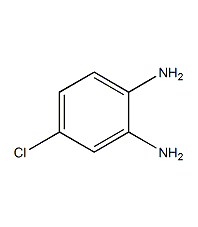
Structural formula
| Business number | 029Z |
|---|---|
| Molecular formula | C6H7ClN2 |
| Molecular weight | 142.59 |
| label |
4-Chloro-1,2-diaminobenzene, 4-Chloro-o-phenylenediamine, p-Chloro-o-phenylenediamine, 4-Chloro-o-phenylenediamine, 1,2-diamino-4-chlorobenzene, 4-Chloro-o-phenylenediamine, 4-Chloro-o-phenylenediamine, 3,4-Diaminochlorobenzene, ClC6H3(NH2)2 |
Numbering system
CAS number:95-83-0
MDL number:MFCD00011691
EINECS number:202-456-8
RTECS number:SS8850000
BRN number:508472
PubChem number:24846834
Physical property data
1. Appearance: Brown powder
2. Density (g/mL, 20℃): Undetermined
3. Relative vapor density (g/mL, air=1 ): Undetermined
4. Melting point (ºC): 70-73
5. Boiling point (ºC, normal pressure): Undetermined
6. Boiling point (ºC, kPa): Not determined
7. Refractive index: Not determined
8. Flash point (ºC): Not determined
9. Specific rotation Degree (º): Undetermined
10. Autoignition point or ignition temperature (ºC): Undetermined
11. Vapor pressure (mmHg, ºC): Undetermined
12. Saturated vapor pressure (kPa, ºC): Undetermined
13. Heat of combustion (KJ/mol): Undetermined
14. Critical temperature (ºC) : Undetermined
15. Critical pressure (KPa): Undetermined
16. Log value of oil-water (octanol/water) partition coefficient: Undetermined
17. Explosion upper limit (%, V/V): Undetermined
18. Explosion lower limit (%, V/V): Undetermined
19. Solubility: Undetermined
Toxicological data
None yet
Ecological data
This substance is harmful to the environment, and special attention should be paid to the pollution of water bodies.
Molecular structure data
1. Molar refractive index: 39.62
2. Molar volume (cm3/mol): 105.9
3. Isotonic specific volume (90.2K ): 294.8
4. Surface tension (dyne/cm): 59.9
5. Polarizability (10-24cm3): 15.70
Compute chemical data
1. Reference value for hydrophobic parameter calculation (XlogP): None
2. Number of hydrogen bond donors: 2
3. Number of hydrogen bond acceptors: 2
4. Number of rotatable chemical bonds: 0
5. Tautomerism.�Number: None
6. Topological molecule polar surface area 52
7. Number of heavy atoms: 9
8. Surface charge: 0
9. Complexity: 97.1
10. Number of isotope atoms: 0
11. Determine the number of atomic stereocenters: 0
12. No Determine the number of atomic stereocenters: 0
13. Determine the number of chemical bond stereocenters: 0
14. Uncertain number of chemical bond stereocenters: 0
15. Number of covalent bond units: 1
Properties and stability
Avoid contact with strong oxidizing agents.
Storage method
Store in a cool, ventilated warehouse. Keep away from fire and heat sources. The packaging is sealed. should be kept away from oxidizer, do not store together. Equipped with the appropriate variety and quantity of fire equipment. Suitable materials should be available in the storage area to contain spills.
Synthesis method
None yet
Purpose
Used in organic synthesis.
extended-reading:https://www.bdmaee.net/wp-content/uploads/2022/08/129-2.jpgextended-reading:https://www.bdmaee.net/22-dimorpholinodiethylether-2/extended-reading:https://www.newtopchem.com/archives/44677extended-reading:https://www.bdmaee.net/wp-content/uploads/2022/08/MS-glue-special-catalyst-MS-glue-catalyst-paint-catalyst.pdfextended-reading:https://www.newtopchem.com/archives/857extended-reading:https://www.morpholine.org/category/morpholine/page/11/extended-reading:https://www.cyclohexylamine.net/reactive-composite-catalyst-spraying-catalyst-pt1003/extended-reading:https://www.newtopchem.com/archives/category/products/page/169extended-reading:https://www.newtopchem.com/archives/44529extended-reading:https://www.bdmaee.net/di-n-octyltin-oxide/

